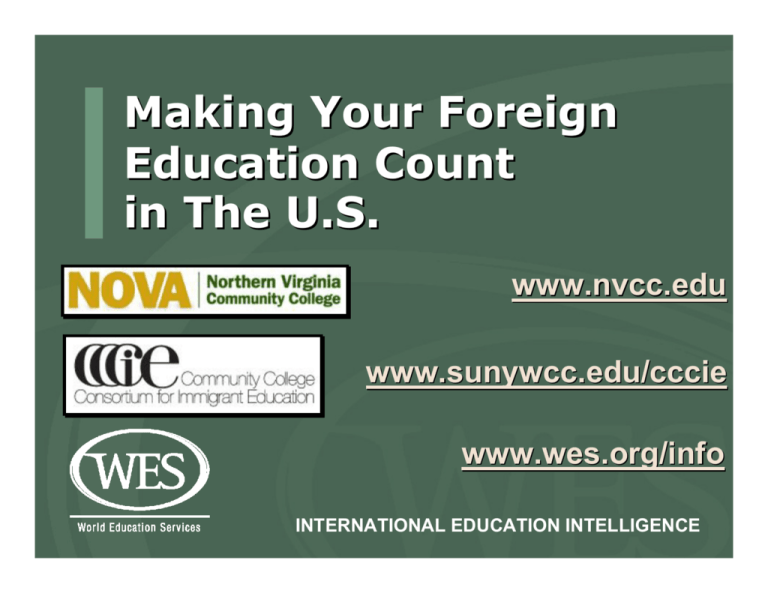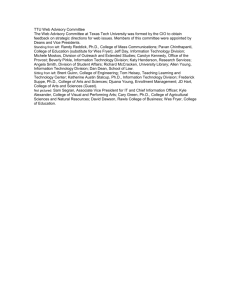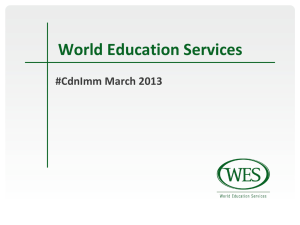Making Your Foreign Education Count In The U.S.
advertisement

Making Your Foreign Education Count in The U.S. www.nvcc.edu www.sunywcc.edu/cccie www.wes.org/info INTERNATIONAL EDUCATION INTELLIGENCE Today’s Agenda • Welcome and Introductions • The Recognition of Foreign Credentials • Using Your WES Evaluation Employment Professional Licensing and Certification Education • NOVA Programs Admission Requirements: Dr. Elizabeth Harper Financial Aid: Ms. Joan Zanders ESL Classes: Ms. Heidi Adamson 2 About World Education Services (WES) • Non-profit organization (NGO), founded in 1974. Has served 750,000 individuals, about 50,000 each year, from all countries • WES Mission: To foster the integration of individuals educated outside the U.S. into academic and professional settings • Primary Service: Providing evaluation reports so that legitimate academic credentials earned abroad are understood and fully recognized • WES reports are widely accepted by universities, licensing boards, employers, government agencies 3 Barriers to Success for Educated Immigrants More than 1.3 million college-educated immigrants in the U.S. are unemployed or working in unskilled jobs. Many others also work well below their skill and educational level – Migration Policy Institute, Uneven Progress, 2008 WHY IS THIS? Not familiar with U.S. employment culture and skills, lack professional networks, lack of U.S. work experience Limited English skills Academic credentials and professional skills/experience are not recognized 4 Foreign Credential Recognition in the U.S. First of all…. Your foreign education does have value in the U.S.! • Each institution/agency sets its own rules regarding recognition and acceptance No government agency or single standard Some institutions do their own evaluations, but most designate external evaluation services • Evaluation services (like WES) Operate independently Charge fees – $75-125 (General) $150-350 (Detailed) 5 Document-by-Document Report $100 • Identifies and describes each diploma or certificate • Indicates periods of education, • Provides an equivalency for each document. This is the report you should generally order for: Employment (when Licensing or Certification is not required) Immigration 6 Comprehensive Course-by-Course Report $160 Document-by-Document report, PLUS : • Lists all subjects completed at the post-secondary level • Provides a U.S. semester credit and grade equivalent for each course • Provides a U.S. grade point average (GPA) on a 4.0 scale This is the report you should order for: Education Professional licensing Professional certification 7 Choosing a Service • Always check with the institution or agency re: What type of report they require What services they accept or recommend • When given a choice - choose wisely Recognition – Are reports widely accepted? Fees – check the total cost, watch for hidden fees Be careful of “sponsored links” found through web searches • National Association of Credential Evaluation Services (NACES) – www.naces.org WES Document Requirements WES authenticates ALL documents Why? • Adds credibility and gives confidence to recipient • Addresses concerns about fraud and diploma mills • Helps U.S. employers verify foreign degrees Obtaining Documents • Country-specific instructions • Getting official documents takes time, but easier than you think 9 Online Evaluation Tools Tells you how your degrees and grades are viewed in the U.S. For unofficial purposes and guidance only Enable you to focus your employment search or academic application at the appropriate level • International Degree Preview ($30) $20 credit back on evaluation fee • iGPA Calculator ($8) How to Use Your Evaluation • Reports can be used for different purposes Education & Professional Licensing/Certification (Detailed) Employment & Immigration (General) • Presenting Your Evaluation Include your WES equivalency, GPA, etc. on your resume and in your cover letter Bring copies to interviews Offer to have official report sent directly • Limits of an Evaluation Not binding on recipient institution Each institution or agency decides how to use For Employment • Employer Familiarity / Recognition • Most government agencies - Federal and State – and large companies accept WES evaluations Smaller businesses may not be familiar with evaluations • Concerns about fraud Companies can easily and quickly verify U.S. degrees, but foreign degrees not easily checked by non-experts • “Sell” (explain) your WES evaluation Mention in resume, cover letter, interview Employers can call WES to verify report, ask questions WES has Employment Resources at www.wes.org/info 12 Gaining U.S. Experience / Service Learning • Volunteering or Internships – allows you to find opportunities to re-enter your career field or try a new field of interest Gain experience in U.S. workplace Utilize, demonstrate and update your skills Build your network Develop references (and maybe a mentor) Strengthen your resume Improve your English • Taking Courses - Even if you have strong academic credentials from overseas, it can be useful to update your skills, gain new skills, or improve your English to improve your chances of finding employment. For Professional Licensing • License is required for some professional activities (e.g. Health-related, Teaching, Accounting) Process is complicated, time-consuming, expensive • BUT: Licensing is not always necessary Related fields may be more easily accessible • Licensing is State-Regulated Each state has separate boards for various professions National certifications are sometimes required 14 For Professional Licensing • Credential Evaluation Usually Required For authentication and coursework Lists and links are provided on: www.wes.org/info www.careersfornewamericans.org • Licensing Boards that accept WES evaluation: Virginia State Board of Accountancy Virginia State Department of Education Maryland State Board of Public Accountancy Maryland State Department of Education Maryland State Board of Professional Engineering 15 For Professional Certification • Professional Certification Voluntary credentialing process Granted by a non-governmental, private association Find your professional association at www.noca.org/Generalinformation/MemberOrganizations Sometimes a prerequisite for state licensing • Professional Associations that accept WES evaluation: American Board for Certification of Teacher Excellence (ABCTE) American Dental Education Association (ADEA) American Speech-Language-Hearing Association (ASHA) 16 For Education • Undergraduate Admission / Transfer Credit Helps college staff determine eligibility Determine advanced standing/transfer credit • Graduate and Professional Degrees • Course-by-Course Evaluations w-GPA if college credits are involved More information - www.wes.org/students 17 Credit Transfer • Each institution decides whether to recognize your non-U.S. academic work • Most will recognize a limited amount of credit toward a degree at their institution • Issues that institutions consider in awarding credit Is your university or college recognized by the ministry of education in your country? How applicable are your courses toward the degree that you wish to pursue? What is the maximum number of credits that the school allows you to transfer? 18 Local Institutions that Accept WES Reports Partial Partial List List –– Always Always check check with with the the Institution Institution Virginia Washington, DC & Maryland George Mason University American University – School of Business James Madison University Georgetown University – School of Nursing and Health Studies Liberty University University of the District of Columbia Northern Virginia Community College Howard University ‐ Graduate School Regent University Hood College Shenandoah University Johns Hopkins University – Business, Nursing, Education, Grad A&S University of Virginia – Nursing, Graduate Programs Loyola University Maryland – Undergraduate Programs University of Virginia's College at Wise Montgomery College Virginia Commonwealth University ‐ School of Pharmacy Morgan State University – School of Business and Management Virginia State University ‐ Undergraduate Studies University of Baltimore 19 Thank you! Questions and Information Handouts at the WES Information Table and www.wes.org/info More about academic programs and further education at NOVA Admission Requirements: Dr. Elizabeth Harper Financial Aid: Ms. Joan Zanders ESL Classes: Ms. Heidi Adamson 20 Overview and Admission Requirements NORTHERN VIRGINIA COMMUNITY COLLEGE (NOVA) Associate Degrees • Two-year degree equivalent to the first two years of a bachelor’s degree • AA and AS degrees are designed to transfer to four-year colleges and universities • AAS and AAA degrees are designed for immediate employment, though some may transfer Examples AA/AS Degrees • Liberal Arts • Science • Business Administration • Computer Science • General Studies • Social Sciences • Engineering • Fine Arts AAS/AAA Degrees • Accounting • Biotechnology • Nursing • Dental Hygiene • Administration of Justice • Automotive Technology • Engineering Technology • Early Childhood Development Certificate Programs • Shorter than degree programs • Designed for immediate employment or to enhance skills • Can earn a certificate and then go on to an associate degree Examples • • • • • • Bookkeeping Contract Management Culinary Arts Food Service Management Real Estate Brokerage Small Business Management • Travel and Tourism Campuses and Centers • Alexandria – Arlington • Annandale • Manassas • Loudoun (Sterling) – Reston • Springfield (Medical Education) • Woodbridge • Extended Learning Institute Class Schedule • • • • Days Evenings Weekends Online 24/7 Admission to NOVA • Open Enrollment • Online Application • Admission of non-citizens Tuition and Fees In-state Out-of-state $105.85 $280.60 Technology Fee $5.50 $5.50 Student Activities Fee $1.10 $1.10 0 $10.00 $112.45 $297.30 Tuition Facilities Fee Total Per Credit Students who have non-immigrant visas or who are undocumented must pay out-of-state tuition. Transferring Credit to NOVA • Register for at least one class at NOVA • Submit credentials to evaluation agency • Have a transcript sent to your NOVA campus student Services Center • Complete a Request for Evaluation and submit to campus Student Services Center • Watch your NOVA email • Credit will be posted to your NOVA record To apply for federal and state financial aid: • You must be a U.S. citizen, eligible non-citizen, or permanent resident. • The first step is completing the Free Application for Federal Student Aid (FAFSA). • If you have a bachelor’s degree or higher-level professional degree, you will not be eligible for a Pell Grant, but you might qualify for some other assistance. • If you don’t tell us about the bachelor’s degree – but we find out later – you could need to pay back a lot of money. Points to remember: • If you have the equivalent of a U. S. bachelor’s degree—or a higher-level professional degree from another country – you MUST declare it. • Ask for an official transcript from schools attended and have the transcript(s) evaluated. • Whether you can use the degree in the U. S. or not, you must tell us you have the degree. • You could benefit by having credits transfer to NOVA and apply to your new program of study. Transfer credits are money in the bank! If you are not eligible for federal or state aid: • Apply for scholarships— – www.nvcc.edu/current-students/paying-forcollege/financial-assistance/index.html (NOVA website - free) – www.fastweb.com (free) – www.collegeboard.org (free) – www.finaid.org (free) Never pay for a scholarship search or a financial aid advisor!! Some alternative education loans might be available, but be careful not to accept a loan with a high interest rate. Credit cards can also have very high interest rates. NOVA’s special programs could also provide funding: • Training Futures • Year Up Talk to a counselor! The financial aid representatives on each campus can assist you, or you can email finaidhelp@nvcc.edu with your questions. Information and brochures will be available at the financial aid table after the presentations!





